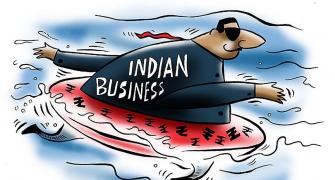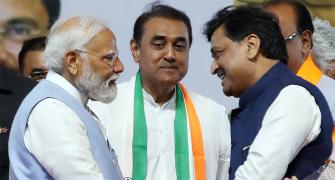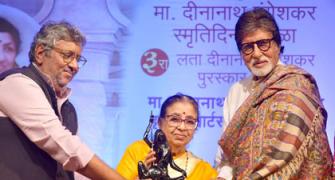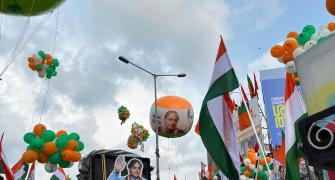The 10 feet by 10 feet office space at Mumbai's bustling 'Dava Bazar' of Mumbai looks like several other shanties in the vicinity -- it has barely enough room for a table and a couple of chairs.
But appearances can be deceptive -- lakhs of rupees worth of business is transacted daily from this and 15 other similar offices in Mumbai.
Say hello to the world of the billwallah, a man who supplies false drug bills to whoever is willing to pay him for them.
Cut to an evening this week. Veljibhai Shah (name changed) trades in bulk drugs, required for the manufacture of several commonly sold brands of drugs in India. He struts into the billwallah's office and asks for a bill for Rs 5 lakh for five kg of Dexamethasone.
Shah hands over a Rs 5 lakh cheque. The billwallah smiles, asks him to wait and offers him a cup of tea. A 10-minute wait is interspersed with our billwallah declaring that he has installed a 'jacu' (he's unable to pronounce the word jacuzzi) at his residence for a grand sum.
"I have moved into a new residence, you see," says the Honda City owner. Soon, one of his "boys" returns with a printed bill for five kg of Dexamethasone with a fictitious batch number and date of import but a real pharmaceutical company's name printed on it.
Shah leaves, promising to return a couple of days later to collect his money in cash, less a two per cent discount. The billwallah deposits the cheque in one of his many accounts.
Once the money is credited to his account, he will return the money, less two per cent, to Shah. Note that the billwallah will have no corresponding purchase record of the bill of sale he issued in less than 20 minutes to Shah. Nor have any bulk drug been sold.
This form of fake billing is widely known in the Indian pharmaceutical industry. Large consignments of bulk drugs like Dexamethasone and tetracycline are smuggled into the country.
No customs duty or sales tax is paid. To be sure, pharmaceutical companies import drugs through legitimate channels and pay duty and taxes on them.
But drugs are smuggled into India, duty is evaded and they are available at low prices on the black market. Traders then procure these drugs for whoever wants to buy them. In the trader's books of accounts, the official price of the drug is mentioned.
But the trader has to show that he bought the drugs from legitimate sources.
So he goes to billwallahs who get him bills that suggest that an Indian pharmaceutical company had supplied these drugs. Apart from smuggled bulk drugs, billwallahs issue similar bogus bills for low quality drugs whose purity may have been altered by a compromised laboratory process.
As a result, the Indian public often can't be sure whether drugs bought are spurious or not.
Says Organisation of Pharmaceutical Producers of India president and vice chairman and managing director of Novartis India Ranjit Sahani: "These are instances of perfect mass murder through the intake of fake drugs. The evidence disappears and the patient is said to have died of the disease and not the drug. This is murder most foul. What makes it worse is that it is motivated by profits."
He adds that several meetings were held jointly by OPPI the Indian Drug Manufacturers' Association, the Indian Pharmaceutical Alliance and the All India Organisation of Chemists and Druggists to assess the magnitude of the spurious drugs problem.
The state government tends to downplay the extent of spurious drugs in the market.
Maharashtra's minister for food and drug administration Anil Deshmukh recently said that only 2-3 per cent of the drugs in the market were spurious. But pharmaceutical industry sources scoff at Deshmukh -- they say that the figure is closer to 30 per cent.
Last year, income tax men raided the Dava Bazaar billwallah and stumbled on fictitious bills at his office and residence.
The raid blew the lid off the multi-crore spurious drugs racket in Mumbai, Delhi and Gujarat. Subsequently, the tax department issued notices to 350 pharmaceutical traders who are believed to have procured fictitious bills from the billwallah.
Says a source at the income tax department: "During the raid we recovered in excess of Rs 50 lakh (Rs 5 million) in black from the accused's person and residence. More interestingly, the billwallah was found to be operating more than 100 bank accounts along the stretch of the western railway line from Churchgate to Mira Road."
The Achilles heel of billwallahs is that, since they issue fictitious bills that purport to be those of reputed pharmaceutical companies, all it takes to catch them is to verify the batch number of bills with the pharmaceutical company.
Says Shah: "We need such bills since we procure the low quality drugs from the black market and from companies that have huge stocks of expired drugs, for a song." Shah complains that the tax man has begun zeroing in on traders who procured bills, instead of picking up the 15 billwallahs in Mumbai's Dawa market. Shah has been issued a notice for a second time. Billwallahs, meanwhile, continue to flourish.







